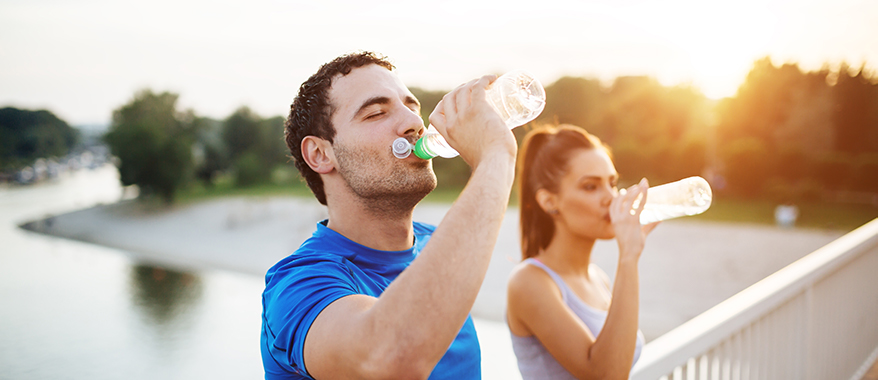Hydration: What athletes need to know

Posted: September 5, 2024
Hydration is just as important as nutrition for athletes. Avoid dehydration and overhydration to perform at your best by following these tips.
Everyday hydration
Proper hydration starts before you hit the court, field or gym. Carry a water bottle with you everywhere to get fluids throughout the day. Don’t rely on your body to signal when you’re thirsty. You could already be dehydrated by that time.
Dehydration can impair your sport-specific technical skills and overall athletic performance. It can also lead to fatigue, nausea, headaches, dizziness, irritability and muscle cramps.
The best way to tell if you’re staying hydrated is to look at the color and volume of your urine. Urine that’s darker and low in volume points to significant dehydration. The goal is to have urine that is regular in volume and light yellow in color. Frequent urinations that are clear mean you’re likely drinking too much water.
To calculate your baseline (without activity) hydration needs in fluid ounces, take your body weight in pounds and divide it by two.
Hydration during physical activity
While you’re exercising or competing, your body loses fluids and electrolytes, such as sodium, potassium, chloride, calcium, and magnesium, through sweat. It’s important to replenish fluids and electrolytes, especially sodium, to stay hydrated and healthy.
Adults should drink 3 to 8 fluid ounces every 15 to 20 minutes (or 13 to 27 fluid ounces per hour). One mouthful of water is about one ounce.
If you’re doing high-intensity training or working out for over an hour, grab a sports drink. Sports drinks provide water, electrolytes and carbohydrates.
Electrolytes help regulate the balance of fluids in your body, improve rehydration and promote muscle recovery. Carbs serve as a fuel source to help you maintain activity.
Hydration after physical activity
Make sure you drink enough fluids after a workout so you can recover quicker. You can do this by measuring your weight before and after exercise. For every one pound lost through sweating, drink 16 to 24 fluid ounces over the next few hours to make up for the deficit.
If you gained weight, you drank too many fluids during your workout (especially if you hydrated before). Drinking too much can result in excess water in your blood and a low sodium concentration, also known as hyponatremia. Although it’s rare, hyponatremia can be fatal.
Talk with a sports dietitian or exercise science specialist to learn about your individual hydration needs with recommendations based on your sport, training, sweat rate and more.




